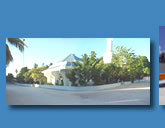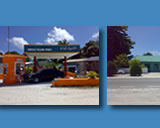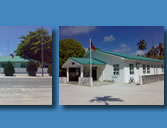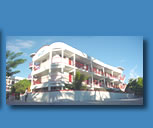|
||
The following article was published in an English Newspaper. The Southern Atolls.Not surprisingly the life style is significantly different beyond the giant Huvadhoo kandu, the massive 85km-wide expanse of ocean - known popularly as the One and Half Degree Channel – that separates the central atolls from further south. Here, there is little interdependence between the atolls, because they are each geographically isolated not only from the rest of the archipelago but also from each other, so it is fortunate that the climate is conductive to cultivating a variety of crops. Many of the islands, particularly around the Equatorial Channel, are more luxuriantly vegetated than their northern neighbors, with small plantation of bananas, yams, taro and manioc, as well as the ubiquitous coconut tree. And since every atoll is very much alone, isolated and largely self-sufficient, it is perhaps not surprising to find obvious peculiarities in each atoll, the most outstanding being the spoken language. Pronunciation and vocabulary changes dramatically as one hops from atoll to atoll, so much so that there is a common agreement to speak Male bas (language) when a visitor from outside the atoll arrives on the island. To visit these parts of the archipelago is to visit the Achilles’
heel of the Maldives, because there has always been – and
still is – an aloofness an inherent jealousy between islanders
from the north and south. Until recently, in fact, the southerners
traded directly with Sri Lanka, since it was equidistant to both
Colombo and Male and they could always fetch a better price for
their fish from the Sri Lankan merchants. At the same time they
were endowed with some twenty years of western influence, with the
British manning an air-base in Gan, the southernmost island, during
the 1960s and 70s. A violent clash between north and south was therefore
imminent when the government monopolized the export of fish and
subsequently ordered the British to sack any southerners under their
employ. Of course the attempted secession by the so-called “United
Suvadive Islands” was doomed from the outset, but the feelings
of their one-time President, Abdullah Afif Didi, still remain loud
and clear in the minds of many people. His
letter to the editor of London Times, published when
the secession was reaching its climax, is worth noting.
|
||
| LINKS | |
NEWS: INFORMATION: BLOGS: RELIGION: SPORTS: MUSIC: PERSONAL SITES: |
|
|
|
|
|||
|
| Home | Contact Us | ©2006 - S. Feydhoo - feydhoo.com |







